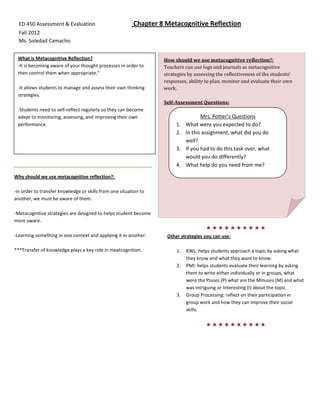Chapter 8, keypoint handout
- 1. ED 450 Assessment & Evaluation Chapter 8 Metacognitive Reflection Fall 2012 Ms. Soledad Camacho What is Metacognitive Reflection? How should we use metacognitive reflection?: -It is becoming aware of your thought processes in order to Teachers can use logs and journals as metacognitive then control them when appropriate.” strategies by assessing the reflectiveness of the students’ responses, ability to plan, monitor and evaluate their own -It allows students to manage and assess their own thinking work. strategies. Self-Assessment Questions: -Students need to self-reflect regularly so they can become adept to monitoring, assessing, and improving their own Mrs. Potter’s Questions performance. 1. What were you expected to do? 2. In this assignment, what did you do well? 3. If you had to do this task over, what would you do differently? 4. What help do you need from me? Why should we use metacognitive reflection?: -In order to transfer knowledge or skills from one situation to another, we must be aware of them. -Metacognitive strategies are designed to helps student become more aware. ď‚«ď‚«ď‚«ď‚«ď‚«ď‚«ď‚«ď‚«ď‚«ď‚«ď€ -Learning something in one context and applying it in another. Other strategies you can use:ď€ ***Transfer of knowledge plays a key role in meatcognition. 1. KWL: helps students approach a topic by asking what they know and what they want to know. 2. PMI: helps students evaluate their learning by asking them to write either individually or in groups, what were the Pluses (P) what are the Minuses (M) and what was intriguing or Interesting (I) about the topic. 3. Group Processing: reflect on their participation in group work and how they can improve their social skills. ď‚«ď‚«ď‚«ď‚«ď‚«ď‚«ď‚«ď‚«ď‚«ď‚«ď€
